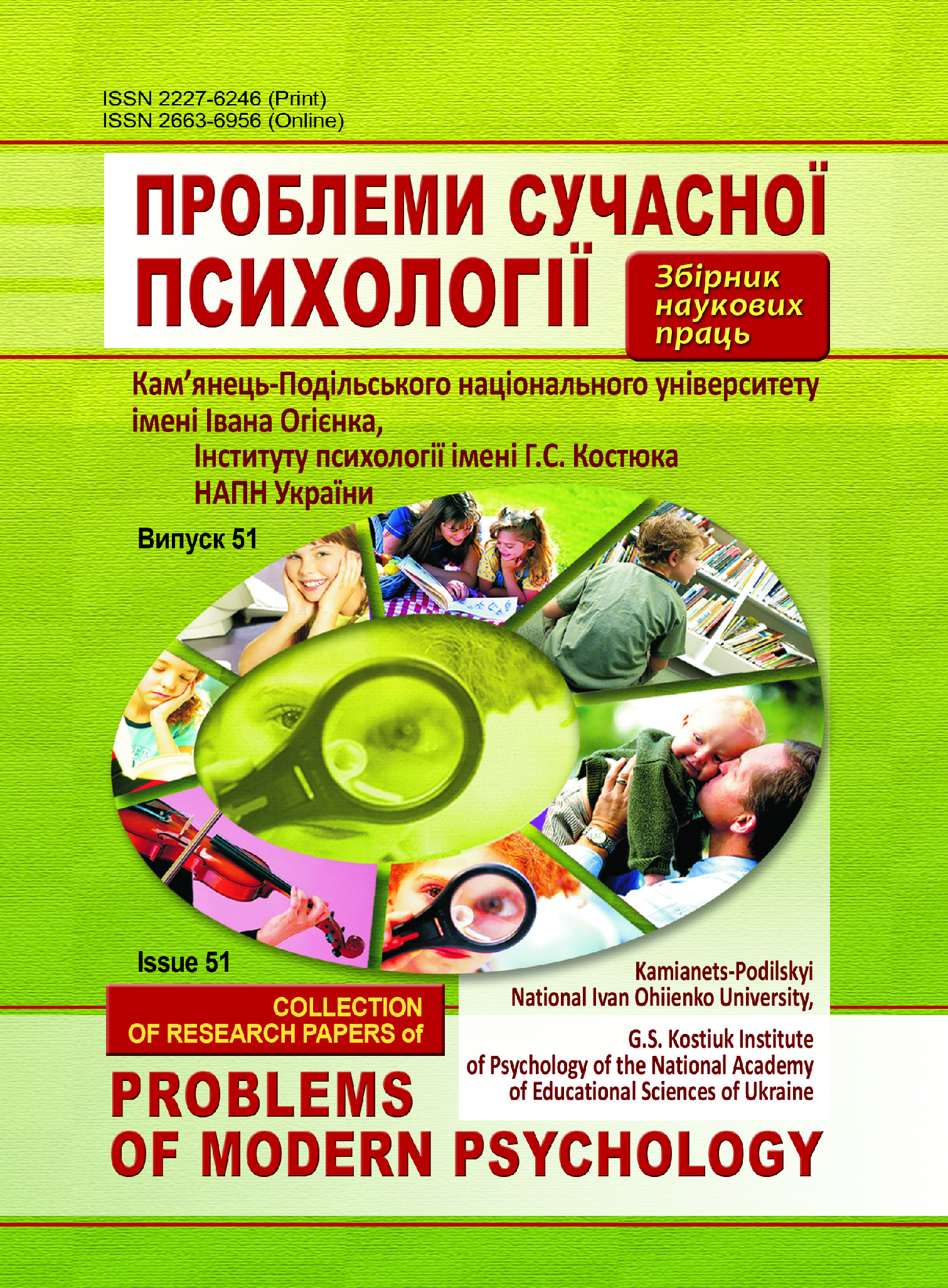Особливості класифікації концепту «Таїнство» активними дорослими користувачами Інтернету
DOI:
https://doi.org/10.32626/2227-6246.2021-51.105-120Ключові слова:
абстрактне поняття, категорії свідомості, когнітивна складність, семантичний диференціал, когнітивна деформаціяАнотація
Мета статті – проаналізувати особливості класифікації абстрактних понять дорослими, які використовують різні джерела інформації: традиційні / друковані й інноваційні / цифрові.
Методи дослідження. Використано метод опитування з відкритим типом питань як основний інструмент для вивчення вибору переважної системи кодування інформації дорослими. Для реконструкції категоріальної структури свідомості респондентів у розумінні ними поняття «Таїнство» було використано метод семантичного диференціалу. Диференціал включає 40 прикметників, що утворюють 7 категорій свідомості за своєю факторіальною структурою («Оцінка», «Сила», «Активність», «Складність», «Упорядкованість», «Реальність» і «Звичайність»). Вищезазначені категорії були встановлені в попередньому дослідженні осіб різних вікових груп і культур.
Результати дослідження. Порівняльний аналіз структури категорії та значення концепту «Таїнство» було здійснено у двох групах дорослих: суб’єкти читання й активні користувачі Інтернету. Визначено, що когнітивна складність свідомості користувачів Інтернету нижча, ніж у суб’єктів читання, за двома параметрами: 1) зменшення кількості категорій, що формують концепт; 2) спрощення організації категорії, представленої лише одним полюсом. Для активних користувачів Інтернету зміст поняття «Таїнство» є близьким до «секрету».
Висновки. Емпіричні дані доводять тенденцію до спрощення категоризації в розумінні абстрактних концептів активних користувачів Інтернету. Це дає підстави позначити нову науково-практичну проблему когнітивної деформації дорослих як вплив Інтернету.
Посилання
Gilmutdinova, N. A. (2020). Osoznat tainu: opyt tsivilizatsionnoi i istoricheskoi komparativistiki [Realizing the Mystery: The Experience of Civilizational and Historical Comparative Studies]. Proceedings of All-Russian scientific and theoretical conference: Soznaniie kak fenomen bytiia cheloveka i obshchestva – Consciousness as a phenomenon of being of a person and society, (pp. 127–135). (April, 23–24). Ulianovsk, UlGTU [in Russian].
Golubinskaia, A. V. (2015). Neirokognitivnyi podkhod k issledovaniiu pokoleniia Z [A neurocognitive approach to researching generation Z]. International Journal of Humanities and Natural Science, 1 (1), 161–167. Retrieved from https://cyberleninka.ru/article/v/neyrokognitivnyy-podhod-k-issledovaniyu-pokoleniya-z. Data dostupa: 14.04.2018 [in Russian].
Grekova, A. A. (2019). Osobennosti myshleniia predstavitelei «tsifrovogo pokoleniia» [Features of thinking of representatives of the «digital generation»].
Vestnik YUUrGU. Seriia: «Psikhologiia» – Vestnik of SUSU, 12 (1), 28–38. DOI 10.14529/psy190103 [in Russian].
Znakov, V. V., Kasavina, N. A., & Sineokova, Yu. V. (2018). Ekzistentsialnyi opyt: tainstvo i problema [Existential Experience: Sacrament andProblem]. Filosofskii zhurnal – Philosophy journal, 11 (2), 123–137 [in Russian].
Kobzova, M. P., Zvereva, N. V., & Shchelokova, O. A. (2018). O nekotorykh osobennostiakh verbalno-logicheskogo myshleniia v norme i pri shizotipicheskom rasstroistve [On some features of verbal-logical thinking in health and in schizotypal disorder]. Klinicheskaia i sotsialnaia psikhologiia – Clinical and social psychology, 7 (3), 100–118. DOI 10.17759/psyclin.2018070306 [in Russian].
Losev, A. F. (1994). Samoie samo [The very one]. Mif. Chislo. Sushchnost – Myth. Number. The essence, (pp. 300–526). Moskva : Mysl [in Russian].
Luriia, A. R. (2017). Psikhologiia kak istoricheskaia nauka. K voprosu ob istoricheskoi prirode psikhologicheskikh protsessov [Psychology as a historical science. On the question of the historical nature of psychological processes]. Istoricheskaia i sotsialno-obrazovatelnaia mysl – Historical and social-educational thought, 9 (3/1). Retrieved from http://www.hist-edu.ru. Data dostupa: 14.04.2020 [in Russian].
Marsel, G. (2012). O smelosti v metafizike [Courage in metaphysics]. Sankt-Peterburg : Nauka [in Russian].
Petrenko, V. F. (2005). Osnovy psikhosemantiki [Basics of psychosemantics]. Sankt-Peterburg : Piter [in Russian].
Smoll, G., & Vorgan, G. (2011). Mozg onlain. Chelovek v epokhu Interneta [The brain online. People in the Internet age]. Moskva : KoLibri [in Russian].
Sultanova, A. S., & Ivanova, I. A. (2017). K probleme normativnykh pokazatelei v patopsikhologicheskoi diagnostike [On the problem of normative indicators in pathopsychological diagnostics]. Klinicheskaia i sotsialnaia psikhologiia – Clinical and social psychology, 6 (2), 83–96. DOI 10.17759/psyclin.2017060207 [in Russian].
Bentler, P. M., & LaVoie, A. L. (1972). An Extension of Semantic Space. Journal of Verbal Learning and Verbal Behaviour, 109, 123–144.
Medvedskaia, E. (2020). Categorization of the Concept of Freedom by the Representatives of Different Information Subcultures. Problemy suchasnoi psykholohii: zbirnyk naukovykh prats Kamianets-Podilskoho natsionalnoho universytetu imeni Ivana Ohiienka, Instytutu psykholohii imeni H. S. Kostiuka NAPN Ukrainy – Problems of Modern Psychology: Collection of research papers of Kamianets-Podilskyi National Ivan Ohiienko University, G. S. Kostiuk Institute of Psychology of the National Academy of Educational Sciences of Ukraine, 50, 167–187. Kamianets-Podilskyi.
Prensky, M. (2001). Digital natives, Digital immigrants. On the Horizon, 9 (5), 1–6.
Osgood, C. E., Suci, G., & Tannenbaum, P. (1957). The measurement of meaning. Chicago and London : University of Illinois Press.
Sparrow, B., Liu, J., & Wenger, D. M. (2011). Google effects on memory: cognitive consequences of having information at our fingertips. Science, 333 (6043), 776–778.
##submission.downloads##
Опубліковано
Як цитувати
Номер
Розділ
Ліцензія
Редакція має повне право публікувати у Збірнику оригінальні наукові статті як результати теоретичних і експериментальних досліджень, які не знаходяться на розгляді для опублікування в інших виданнях. Автор передає редколегії Збірника права на розповсюдження електронної версії статті, а також електронної версії англомовного перекладу статті (для статей українською та російською мовою) через будь-які електронні засоби (розміщення на офіційному web-сайті Збірника, в електронних базах даних, репозитаріях та ін).
Автор публікації зберігає за собою право без узгодження з редколегією та засновниками використовувати матеріали статті: а) частково чи повністю в освітніх цілях; б) для написання власних дисертацій; в) для підготовки абстрактів, доповідей конференцій та презентацій.
Автор публікації має право розміщувати електронні копії статті (у тому числі кінцеву електронну версію, завантажену з офіційного web-сайту Збірника) на:
- персональних web-ресурсах усіх Авторів (web-сайти, web-сторінки, блоги тощо);
- web-ресурсах установ, де працюють Автори (включно з електронними інституційними репозитаріями);
- некомерційних web-ресурсах відкритого доступу (наприклад, arXiv.org).
Але в усіх випадках обов’язковою є наявність бібліографічного посилання на статтю або гіперпосилання на її електронну копію, що містяться на офіційному сайті Збірника.






